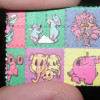停止tober: The difficulty of quitting
Question
I’m doing Stoptober. Again. And just like with dry January, every time I give up alcohol, I start drinking all kinds of fizzy drinks and eating loads of chocolate. Can I save my liver without becoming fat?
Answer
Producer Georgia Mills took an opportunity to have a chat with addiction specialist, Bianca Jupp.
Bianca - Everyone needs a vice Georgia. So this gets back to this idea of this neurochemical that I was talking about before - dopamine. Every time you do something rewarding, and when you take drugs this hit of dopamine. Presumably, when you drink you do it at a certain time of day…
Georgia - In the evening. Just to let the listeners know!
Bianca - Not first thing in the morning. When you get home from work. For me it’s if I’ve had a particularly stressful day or my experiment’s failed. I’m particularly a big fan of crying into a beer. So the brain essentially becomes expectant of this dopamine hit that it’s going to get, it’s going to say “hey, I’ve finished work now I want a drink”. But it doesn’t happen, so beyond dopamine signalling this reward, it’s involved in signalling the prediction of reward. Whether or not it’s more or less than what is expected.
It’s a bit like if you got to your vending machine and you put your pound in and you get your chocolate bar. But all of a sudden two chocolate bars come out and you're like ah, whoopee, this is amazing! In the same way, if you put your pound in the vending machine and then you don’t get a chocolate bar you’re like oh no, that’s really terrible and this happens to reduce dopamine.
So yes, essentially this is what’s happening. Your bain’s looking for it’s hit of dopamine and so you're filling it with other things that are rewarding so fizzy drinks, chocolate bars.
Georgia - I’ll try to find satsumas more rewarding, okay.
Jess - Maybe go for a run.
Chris - My friend who gave up smoking said he then developed an addiction to chocolate bars instead. And then said, instead of fighting the risk of lung cancer and heart disease he’s fighting the risk of diabetes instead. So it’s like robbing Peter to pay Paul. Bianca, thank you very much.
Jacob?
Jacob - I was just wondering if we overabuse that, and some people do, can we run out of dopamine in our lifetime?
Bianca - No. It’s constantly replenished like all neurotransmitters. But it’s actually something that we do see in addiction. We have different levels of dopamine so the receptors actually for dopamine are reduced in addicts so this may be why they’re able to take more drugs, they need more drugs just to get the same effect. And the question is is this a cause or effect? Is this because people have been smashing their brain with lots and lots of dopamine or is it actually a pre-existing deficit and maybe this is the reason why they takes drugs in the first place?
Chris - It’s not part of the ‘come down’ when people have taken a drug of abuse that mobilises lots of these nerve chemicals? I’m thinking of things like cocaine. Now I know that it doesn’t work on dopamine, it generally affects things like serotonin, doesn’t it, cocaine? It pushes the levels up very high in your brain. It displaces lots from the ends of these nerves. Don’t you then end up with a depletion for a little while and that’s why you feel bad afterwards while you replenish?
Bianca - Yes, certainly. Cocaine actually is a dopamine re-uptake inhibitor.
Chris - So it does boost dopamine as well?
Bianca - Yeah.
Chris - But it’s going to leave you feeling robbed of dopamine for a while.
Bianca - Yeah. People love to talk about ‘terrible Tuesdays’ after a big weekend on cocaine. And yeah, you definitely see a depletion. It does, it resolves over time.







Comments
Add a comment